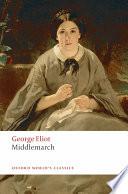Quotes from book
Middlemarch

Middlemarch, A Study of Provincial Life is a novel by the English author George Eliot , appearing in eight instalments in 1871 and 1872. Set in a fictitious Midlands town from 1829 to 1832, it follows distinct, intersecting stories with many characters. Issues include the status of women, the nature of marriage, idealism, self-interest, religion, hypocrisy, political reform, and education. Despite comic elements, Middlemarch uses realism to encompass historical events: the 1832 Reform Act, early railways, and the succession of King William IV. It views contemporary medicine and examines reactionary views in a settled community facing unwelcome change. Eliot began writing the two pieces that would form the novel in 1869–1870 and completed it in 1871. Initial reviews were mixed, but it is now seen widely as her best work and one of the great novels in English.

“The memory has as many moods as the temper, and shifts its scenery like a diorama.”
Source: Middlemarch

“It is always fatal to have music or poetry interrupted.”
Source: Middlemarch

“One can begin so many things with a new person! - even begin to be a better man.”
Source: Middlemarch

“He distrusted her affection; and what loneliness is more lonely than distrust.”
Variant: What loneliness is more lonely than distrust?
Source: Middlemarch (1871)

“Miss Brooke had that kind of beauty which seems to be thrown into relief by poor dress.”
First lines.
Source: Middlemarch (1871)

“It's a father's duty to give his sons a fine chance.”
Source: Middlemarch

Source: Middlemarch (1871), Chapter 1 (misprinted as "Some people did" in some editions, such as Penguin Signet Classics).

“But what we call our despair is often only the painful eagerness of unfed hope.”
Source: Middlemarch (1871)

“What do we live for, if it is not to make life less difficult to each other?”
Middlemarch (1871)
Context: What do we live for, if it is not to make life less difficult to each other? I cannot be indifferent to the troubles of a man who advised me in my trouble, and attended me in my illness.

“Blameless people are always the most exasperating.”
Source: Middlemarch

“A prig is a fellow who is always making you a present of his opinions.”
Source: Middlemarch

“If one is not to get into a rage sometimes, what is the good of being friends?”
Source: Middlemarch